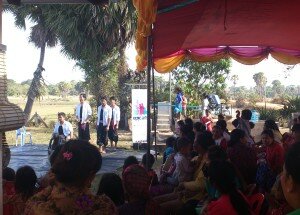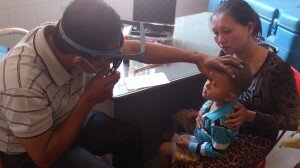Benefiting from mutual learning experiences in Cambodia – Peer-to-peer exchange visits
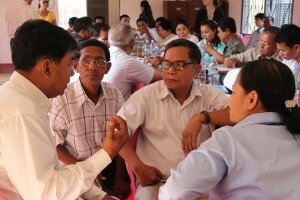
How can councils get closer to citizens? During the exchange visit, councilors from Aek Phnum and Chet Borei district share their best practices.
April 2014
Kratie and Battambang, CAMBODIA – In May 2014, the first term of district, municipal and provincial councils in Cambodia will come to an end. This is a good opportunity to look back and review the experiences of local government officials over the past five years.
Councillors and representatives of the administration of Chet Borei District of Kratie Province visited councillors of Aek Phnum District, Battambang Province to exchange and learn from one another’s experiences in office. The exchange was jointly facilitated by the Secretariat of the National Committee for Sub-National Democratic Development, Voluntary Services Overseas (VSO) and the GIZ implemented joint European Programme for Strengthening Performance, Accountability and Civic Engagement (EU SPACE).
VSO, an international development charity works with volunteers alongside local organisations that serve the poor. In Cambodia, VSO volunteers work with several districts. EU SPACE is the technical cooperation mechanism of the NCDD-S, European Union, Sweden and Germany and is implemented by GIZ. Its objective is to promote transparent, citizen responsive, accountable and capable councils at the sub-national level.
At the event, district and commune representatives came together, eager to learn how serving as an official representative developed their careers, and changed their lives.
The power of peer-to-peer learning
VSO and EU SPACE are not strangers to the value peer-to-peer learning offers. In 2013, VSO and EU SPACE organised similar exchange visits, which proved to be a success. The exchange visits demonstrated that peer-to-peer learning complements expert inputs as well as technical and policy advice.
Since 2011, EU SPACE in cooperation with the NCDD-S have also facilitated exchange between Cambodian and German representatives. Over the past few years, two German municipal councillors have visited their Cambodian peers.
Councillors reflect on the past five years in office
During the visit, district councillors shared their experiences on how their professional and personal lives have changed since they entered office in 2009.
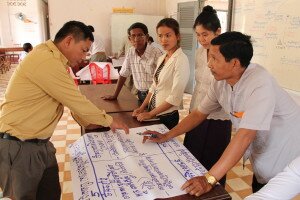
What can be done better during the next mandate? Councilors jointly reflect on experiences and lessons learnt.
The atmosphere during the one-day exchange visit was relaxed and lively. The facilitators of EU SPACE as well as representatives from the two districts made an effort to make everyone comfortable and encouraged discussion from the beginning. Together, the councillors reflected on their roles and responsibilities, on their strengths, weaknesses and challenges. They shared experiences on how to better engage with citizens and civil society organisations; how to implement and disseminate decisions of the council; how to organise the planning process of councils; and how to encourage more equitable gender participation. They highlighted that the relationship between councillors and citizens has improved through the increased engagement of councillors with their local communities.The councillors discussed the impact of their political careers on their personal life. “I am quite popular in my area,” a councillor of Aek Phnum candidly shared. “There is hardly a social event in my district, which I am not invited to.”
Challenges persist
The lively discussions between the councillors also exposed the challenges local governments in Cambodia face. The councillors of both districts pointed to unclear responsibilities which hamper their effectiveness; a lack of resources; and the need to build capacity. Further, they mentioned that it remains difficult to promote the participation of citizens in remote areas.
“We will bring back many new ideas applicable to our daily work,” a participant of Chet Borei District pointed out. Participants also recommended that further exchange visits should take place in order to give more district councillors the opportunity to learn from each other.
Trust and Control – Consumer Field Trip to where the food is grown
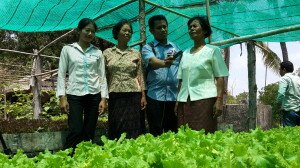
Media interviewed Ms. Tiv Chhat a farmer from Thmor Reap village, Pong Ror Commune, Rolea Baear District.
22 March 2014
Kampong Chhnang – Forty-one costumers of Natural Agri-Products shops (NAP), a social-business branch of the Center for Study and Development in Agriculture (CEDAC) in Phnom Penh, joined a one-day field trip to Kampong Chhnang province to see where their food is sourced. The field trip, including local media, visited organic vegetable produces in Thnoung Kambot village; Svay Chhroum commune and Thmor Reap village; Dok Kroung village; and Pong Ror commune of Rolea Baear District.
The visit is part of CEDAC’s Participatory Guarantee System (PGS) – a locally focused quality assurance system. The consumers certify producers based on active participation and foundation of trust, transparent relationships and dialogue as well as knowledge exchange.
Consumers learned the behind-the-scenes of organic farming and biological control approaches to agriculture. The Cooperation between CEDAC and the GIZ project ASEAN Sustainable Agrifood Systems (Biocontrol) supports farmers to strengthen their knowledge on irrigation techniques, organic fertilizer production, protection of useful insects (predators) and application of other useful Biocontrol Agents (BCA) like Trichoderma Harzianum.
The customers of the NAP shops in Phnom Penh enjoyed the trip out of the city and actively discussed organic agriculture, health and environmental issues with farmers and the advisors from CEDAC and GIZ.
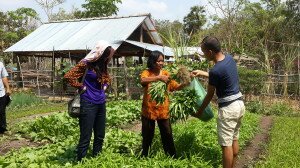
Consumers bought fresh products from Ms. Chan Simoeun, farmer in Thnoung Kambot village Svay Chhrum Commune, Rolea Baear District
The participants of this field visit are now 100% confident of product origin and quality of the organic vegetables available in eight NAP shops in Phnom Penh. They want to share their impressions with their friends and relatives as well.In addition to the consumer field trips, CEDAC and GIZ are introducing a new Documentation Handbook for farmers, which is based on IFOAM Standards – an internationally applicable organic standard that can be used directly for certification. The farmers have to document every input and activity for their production. The data is controlled and verified first by commune leader, then by the internal inspector, and finally by the ICS Supervisor in CEDAC Headquarters. Trust and Control are going hand in hand.
Visit NAP on facebook: https://www.facebook.com/CEDACNAP
Contact:
Claudius Bredehöft
National Project Coordinator Cambodia
ASEAN Sustainable Agrifood Systems (Biocontrol)
Mobil: +855 12 21 54 30
Email:
